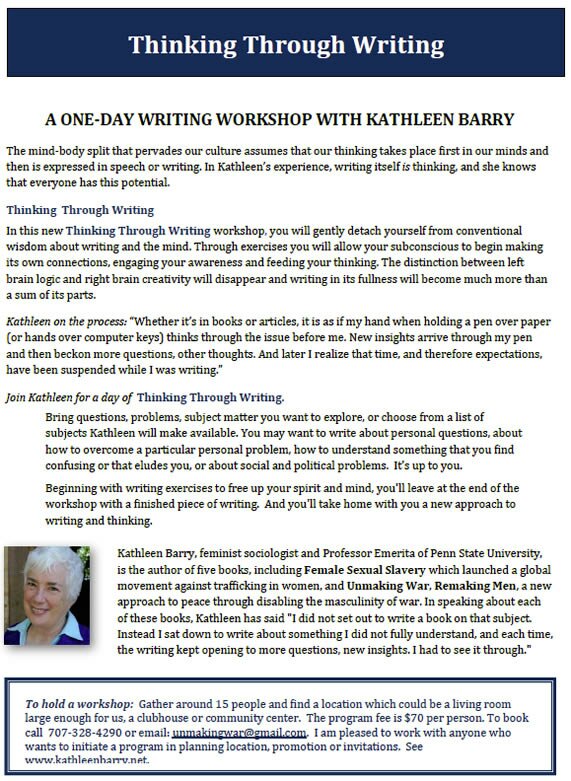New Programs
Unmaking War, Remaking Men, like my first book, Female Sexual Slavery (1979), is a call to action! Join me in my program making change! to discover how through our own empathy we can "Reshape Our Politics, Our Soldiers and Ourselves." Or over a weekend, hold a short course Unmaking War, Remaking Men: Women, War and Peace in which we will study universal human rights as a global counterpoint to the masculinity of war. Or for new as well as experienced writers, my program Thinking Through Writing taps subconscious knowledge to enrich and deepen your writing. Click the links below to see the complete brochures and scroll down to see them and more about me.
New Course Proposal (PDF, 352KB)
Making Change Program Flyer (PDF, 159KB)
Thinking Through Writing Flyer (info below)
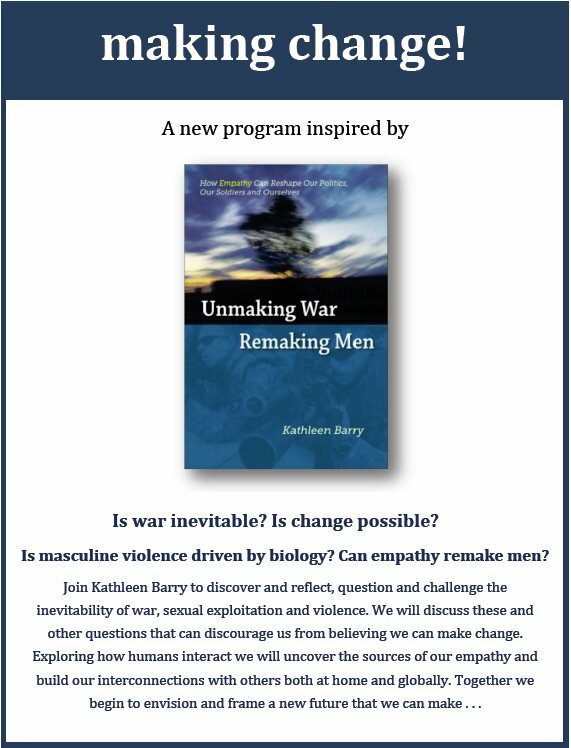
VFA Introduces Kathleen Barry
KATHLEEN BARRY
Feminist, Sociologist, Writer and Activist,
Launched a Global Movement Against Trafficking in Women
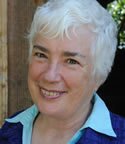 I never set out to be single (you don't "get single" like you "get married") and growing up in the 1950s it was Elvis not Susan B. Anthony who captured my imagination. The oldest of three children, I was born in Syracuse, New York to James and Dorval Barry who had just survived the Great Depression. Dad was a laborer in road construction in the summer when he barely made enough for us to get by and was laid off of work every winter when he occasionally got snow-plowing jobs to supplement unemployment. Although we needed the money, he considered it his patriarchal (his word) duty to support his family so that his wife could stay home with her children. As she did not like her children, that left me during summer vacations from school spending most of my day babysitting my younger brothers on our front porch, laying the foundation for my later choice to not be a mother.
I never set out to be single (you don't "get single" like you "get married") and growing up in the 1950s it was Elvis not Susan B. Anthony who captured my imagination. The oldest of three children, I was born in Syracuse, New York to James and Dorval Barry who had just survived the Great Depression. Dad was a laborer in road construction in the summer when he barely made enough for us to get by and was laid off of work every winter when he occasionally got snow-plowing jobs to supplement unemployment. Although we needed the money, he considered it his patriarchal (his word) duty to support his family so that his wife could stay home with her children. As she did not like her children, that left me during summer vacations from school spending most of my day babysitting my younger brothers on our front porch, laying the foundation for my later choice to not be a mother.
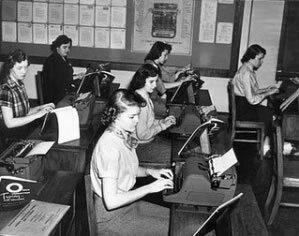 Through my teenage years, I yearned to get out of that house. All I wanted was to be independent. I did not think beyond that. My parents' dream for me to graduate high school, get a job as a clerical worker in an office where I would find among the professional men someone to marry, raising my standard of living and possibly, hopefully theirs. The school counselor's set me on that path by tracking me in a "business" meaning secretarial curriculum in high school. Typing, shorthand, sewing, cooking was to round out my preparation for womanhood.
Through my teenage years, I yearned to get out of that house. All I wanted was to be independent. I did not think beyond that. My parents' dream for me to graduate high school, get a job as a clerical worker in an office where I would find among the professional men someone to marry, raising my standard of living and possibly, hopefully theirs. The school counselor's set me on that path by tracking me in a "business" meaning secretarial curriculum in high school. Typing, shorthand, sewing, cooking was to round out my preparation for womanhood.
To be honest, at the time, going to college never entered my mind. I knew I was not one of those college-bound kids who rarely associated with us working class kids headed for dead end jobs. And I saw them as "those people" as my Dad referred with resentment to the middle classes who always had more, knew more than us and knew it. Then as if out of the blue, just a few months before high school graduation, my typing teacher asked me one day after school if I "ever thought of going to college." I went blank. "No." But she did not let it go. Before I fully grasped what going to college would mean for my life, I knew this could be my ticket to independence. Even though I did not have the required courses, excitedly I applied to and was accepted at Oswego State Teachers College (SUNY). Angered, parents saw their plan for my upward mobility falling apart. They assured me that I would receive no support from them.
By my sophomore year, I faced the stark reality that, already deeply in debt with loans, I could not financially afford to continue my college education. I quit and assumed I was doomed for the clerical pool again. There was a serious shortage of school teachers at the time and I landed a teaching position, 4th grade. That was the first time that I ever did something I truly loved - teaching - so I knew I would eventually find my way back to college.
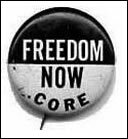 Meanwhile the civil rights movement hit Syracuse, then a completely segregated city, with all blacks of every class living in one city ward, a ghetto. From my earliest remembering, riding with my family to church every Sunday through the ghetto, I was repelled by the way whites talked about black people. That repulsion grew into anger and by the time I was 20 in 1961, I joined the Congress of Racial Equality (CORE). The virulent resistance of Syracusans to desegregation crushed my naïve belief that changing attitudes with facts could change racist behavior. These were the years, although I did not know it then, in which I laid the groundwork for becoming a sociologist, giving me a stronger base for my activism.
Meanwhile the civil rights movement hit Syracuse, then a completely segregated city, with all blacks of every class living in one city ward, a ghetto. From my earliest remembering, riding with my family to church every Sunday through the ghetto, I was repelled by the way whites talked about black people. That repulsion grew into anger and by the time I was 20 in 1961, I joined the Congress of Racial Equality (CORE). The virulent resistance of Syracusans to desegregation crushed my naïve belief that changing attitudes with facts could change racist behavior. These were the years, although I did not know it then, in which I laid the groundwork for becoming a sociologist, giving me a stronger base for my activism.
I put my love of teaching children together with my growing social consciousness of poverty and discrimination and volunteered to teach in a school for migrant children in Texas for a year. I was in my early twenties and under tremendous pressure to marry, not only from my family, but with the disappearance of my longtime girlfriends into their marriages and babies. So, while I was in Texas, I met this guy, Ken, who then seemed to me to be a kind of intellectual. After months of dating we became engaged. There was no magic, either with him or in doing the accepted thing. Ironically, it was Catholicism that saved me. Divorce was prohibited by the Church, and I was not about to be sentenced to lifelong misery, the kind I just escaped. I realized that I neither loved him enough to marry nor did I want to marry, just yet. I was approaching my mid twenties with the escalation of pressure to marry. And then I dropped religion and its patriarchal control of women from my life.
In 1965 when it was time to leave Texas, I moved to Detroit with my teacher-roommate in Texas where I taught in the first years of Head Start and joined CORE there. At the same time, I was taking college courses wherever I lived until I finally received my BA from Wayne State University in Detroit in 1978, nine years after I graduated from high school. By then, ready to move on from teaching children, I earned a Masters from Wayne State and worked in the school district's anti-poverty programs.
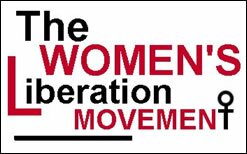 In 1967, at the age of 26, I sat down with 5 or 6 other women for the beginnings of one of those small Consciousness Raising groups that were spontaneously erupting all over the country into the Women' s Liberation Movement. We took women's need for equality for granted but knew we had to get to deeper, yet unspoken issues - abortion rights, welfare rights, rape, wife abuse. Although I was in a relationship with George, marriage slipped from my mind and then I discovered that sex no longer need be confined to marriage, and intimacy need not be only with men. Whew! We feminists spoke our anger and pain to each other and turned it into activism. We testified in speak outs and took our guerilla theater to the streets. While it would be a decade before I would begin to think of myself as a writer, the prediction of my 7th grade aptitude test, feminist issues filled me with subject matter and an urge to write. The first article I wrote appeared in the first issue of Women: A Journal of Liberation. After Miss McCarthy my high school typing teacher who coaxed me into college, nothing else shaped my life more significantly than radical feminism as I was there with all those women shaping it - the Women's Liberation Movement. In 1972 I became the Women's Advocate and Sacramento State University in California.
In 1967, at the age of 26, I sat down with 5 or 6 other women for the beginnings of one of those small Consciousness Raising groups that were spontaneously erupting all over the country into the Women' s Liberation Movement. We took women's need for equality for granted but knew we had to get to deeper, yet unspoken issues - abortion rights, welfare rights, rape, wife abuse. Although I was in a relationship with George, marriage slipped from my mind and then I discovered that sex no longer need be confined to marriage, and intimacy need not be only with men. Whew! We feminists spoke our anger and pain to each other and turned it into activism. We testified in speak outs and took our guerilla theater to the streets. While it would be a decade before I would begin to think of myself as a writer, the prediction of my 7th grade aptitude test, feminist issues filled me with subject matter and an urge to write. The first article I wrote appeared in the first issue of Women: A Journal of Liberation. After Miss McCarthy my high school typing teacher who coaxed me into college, nothing else shaped my life more significantly than radical feminism as I was there with all those women shaping it - the Women's Liberation Movement. In 1972 I became the Women's Advocate and Sacramento State University in California.
My first book, Female Sexual Slavery (1979), translated in several language and still in print in English since its first publication, launched me into global activism against sexual exploitation and trafficking in women two decades before that issue came of age in the United States. I earned a dual doctorate in Sociology and Education at University of California, Berkeley. My dissertation on the social origins of nineteenth century American feminism, a background preparation for my next book, Susan B. Anthony: A Biography of a Singular Feminist. By the late 1980s, having been a feminist activist for two decades, having seen how Anthony was dismissed by contemporary feminist historians, I saw her life as a model of feminist activism. My teaching shifted to university students. I joined the faculty of the Sociology Department at Brandeis University in 1981 to teach Feminist Theory. In 1988 I moved on to Penn State University as sociologist in the multi-disciplinary department of Human Development and Family Studies.
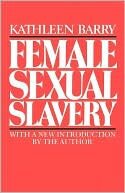 Through the 1980s, I unintentionally become a one-woman movement against and global expert on trafficking in women and children. One impact of Female Sexual Slavery was that the United Nations took up the issue of trafficking once again. But it would take many more years before American feminism would take up that issue. At the time, the radical feminist movement contested pornography but it had not yet connected the exploitation of women in porn to prostitution and trafficking. At the 1988 radical feminist conference on sexual liberals and the attack on feminism, I announced that as a one-woman movement is a contradiction in terms, "I give this to you." With Dorchen Leidholdt, I cofounded the Coalition Against Trafficking in Women, a UN-NGO, with Category II, human rights status.
Through the 1980s, I unintentionally become a one-woman movement against and global expert on trafficking in women and children. One impact of Female Sexual Slavery was that the United Nations took up the issue of trafficking once again. But it would take many more years before American feminism would take up that issue. At the time, the radical feminist movement contested pornography but it had not yet connected the exploitation of women in porn to prostitution and trafficking. At the 1988 radical feminist conference on sexual liberals and the attack on feminism, I announced that as a one-woman movement is a contradiction in terms, "I give this to you." With Dorchen Leidholdt, I cofounded the Coalition Against Trafficking in Women, a UN-NGO, with Category II, human rights status.
While teaching full-time, writing the Anthony biography, I traveled the world for many years speaking and organizing against trafficking and to end prostitution. Through a collaboration with UNESCO and with support of feminist activists from different world regions, I developed a model for a new international law, The Convention Against Sexual Exploitation, which would make prostitution, pornography and sexual trafficking a violation of human rights in international law. Although not yet adopted by the U.N., I was undaunted. Sweden became the first of many countries to adopt and criminalize the customers who buy sex. Vietnam, when it began to shift to a market economy was on the brink of being invaded by massive sex industries. I organized a feminist seminar there in 1993. Vietnam, too, criminalized customers in state law. A few years later my edited volume Vietnam's Women in Transition (1996), a collection of essays from American and Vietnamese feminists, was published.
With the normalization of sexual exploitation of prostitution as sex work and the massive explosion of pornography's sexual objectification and violence through the Internet, I turned to my next book, Prostitution of Sexuality: Global Exploitation of Women which was published in 1995 and includes the model law for criminalizing customers of the sex trade.
By the age of sixty, the pace and pain of my work that kept me in the center of controversy and constantly under attack from the sex industries caught up with me and my health. I took an early retirement and moved back to California. Fortunate for me personally, feminists and human rights organizations globally were beginning to seriously take up the issue of trafficking while women who survived prostitution were creating programs to help women get out of it.
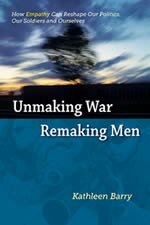 I needed to rest. My doctors told me I should try "working out of the other side of your brain." I did not have a clue of how to do that until I found myself painting first with pastels and then with oils and surprise to me, being an artist for the first time in my life became my passion. I truly love dragging my easel and paints out for three hours of painting to some lovely landscape, seascape or cityscape scene which are easily within reach here in Sonoma County of Northern California. Or I pick up my camera and head to the ocean. Painting and photography shows of my work are on my horizon.
I needed to rest. My doctors told me I should try "working out of the other side of your brain." I did not have a clue of how to do that until I found myself painting first with pastels and then with oils and surprise to me, being an artist for the first time in my life became my passion. I truly love dragging my easel and paints out for three hours of painting to some lovely landscape, seascape or cityscape scene which are easily within reach here in Sonoma County of Northern California. Or I pick up my camera and head to the ocean. Painting and photography shows of my work are on my horizon.
By 2006 with good medical treatment, my energy began to return. I had been watching with anger as George W. Bush manipulated the U.S. into committing war crimes with its invasion and occupation of Iraq. In that summer, something stirred my consciousness when I began to hear reports of "the loss of innocent lives" in the Israeli-Lebanon War. "When," I thought, "we set aside one group of human beings who are to be protected (even though today's militaries ignored that law) from harm in war zones, we construct another group, men in combat, who are killable." Soon I found myself back to writing for the first time in more than a decade. My latest book Unmaking War, Remaking Men: How Empathy Can Reshape Our Politics, Our Soldiers and Ourselves was published in 2011. Returning to feminist political activism, teaching workshops and lecturing, at the age of 70 I am excited to discover that "I'm back!"
Find me at kathleenbarry.net and say "hi" on my blog if so inspired.
Contact Kathleen Barry: barry.kathleen@att.ne
Comments to: Jacqui Ceballos jcvfa@aol.com
![]()
Thinking Through Writing Flyer (PDF, 84KB)
